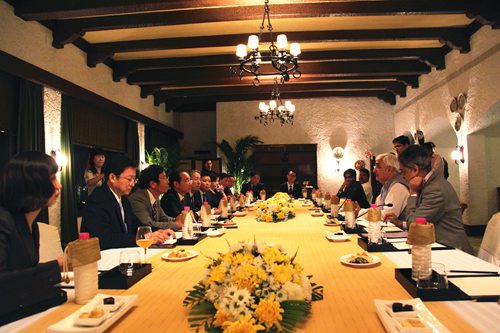|
 |
|
MEET THE PRESS: Indian External Affairs Minister Salman Khurshid (second right) is interviewed by Chinese press in New Delhi on September 16 (XUZHE) |
Indian Prime Minister Manmohan Singh is scheduled to visit Beijing in October. In a joint interview in mid-September in New Delhi with Chinese media, including Beijing Review, Indian External Affairs Minister Salman Khurshid shared his views on relations between India and China and the upcoming visit by Singh. Excerpts of the interview follow:
There is an "overall consensus" in India to develop relations with China without aligning with any other country against the latter, according to Indian External Affairs Minister Salman Khurshid.
"Some people have suggested that the United States, Japan and India should work together against China. We say no. We are very clear that we have an open and honest relationship with China, and we also have an open and honest relationship with the United States and Japan.
"We don't want to get tied up with somebody; our sovereign decision is to have a full relationship with China," Khurshid said in the interview with Chinese journalists in New Delhi ahead of Indian Prime Minister Manmohan Singh's scheduled visit to Beijing.
When Singh arrives in China, it will be the first time since 1954 that the two countries' heads of government will have exchanged visits in the same year. In May, Premier Li Keqiang visited India on his first overseas trip after taking office in March.
"We were very pleased that his first stop outside of China as premier was in India. I think that was an important indication that there is something very significant in the growth of our relationship," Khurshid said.
He stressed that there are strong fundamentals that provide a base for the bilateral relationship, which include complementaries between the two economies and imperatives for the two countries to work together in handling global and regional issues of common interests.
He also called for more exchanges between the two countries to enhance mutual trust and to expand cooperation.
"Trust is not something you can switch on and off. Trust is something based on experiences and exchanges between people, based on sharing sentiments and having common positions in facing challenges," he said.
Khurshid said he would like to see more of such visits coming from China and the establishment of Chinese-style industrial parks in his country. He also encouraged more Indians to travel to China, and said he was looking forward to seeing the growth of bonds with China, such as the building of sister cities.
"Chinese food is the most popular (foreign) food in India, and I hope someday Indian food can also become the most popular foreign food in Beijing," he said.
Regarding the China-India boundary issue, the Indian minister said he believed it was a very small issue that the two sides needed to work on from time to time.
"We make common efforts to move step by step toward (solving) our boundary issue. I think we have made very satisfying progress. If China has a greater stake in the Indian economy and we have greater participation in the Chinese economy, many of these issues will get solved," he added.
Khurshid said the two countries should look at collaboration and cooperation from a wider viewpoint.
"I look forward to the day when a decision needs to be made and people look at India and China, and say, 'We cannot make this decision unless both of them are on board,'" Khurshid added.
China and India are making concerted efforts to expand their bilateral trade volume to $100 billion by 2015. However, Chinese companies, such as telecommunication firms Huawei and ZTE, have been frustrated by their efforts to expand into the Indian market.
"The concern (from India) is partly based on the desire to protect Indian manufacturing and partly from security issues. This is just a concern. Even in our government, we have differing views on how much the concern should be taken into consideration," Khurshid said.
Email us at: liuyunyun@bjreview.com | 